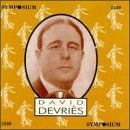| All Artists: André Messager, Jules Massenet, Giuseppe Verdi, Xavier Leroux, Charles Gounod, Charles Lecocq, Francois-Adrien Boieldieu, Edouard Lalo, Georges Bizet, Franz Lehar, Gabriel Faure, Reynaldo Hahn, Emile Nerini, David Devries, Gabrielle Lejeune-Gilbert Title: David Devriès Members Wishing: 1 Total Copies: 0 Label: Symposium Release Date: 5/13/1997 Genres: Special Interest, Pop, Classical Styles: Vocal Pop, Opera & Classical Vocal, Historical Periods, Early Music, Modern, 20th, & 21st Century Number of Discs: 1 SwapaCD Credits: 1 UPC: 760411220021 |
Search - André Messager, Jules Massenet, Giuseppe Verdi :: David Devriès
 | André Messager, Jules Massenet, Giuseppe Verdi David Devriès Genres: Special Interest, Pop, Classical
|
Larger Image |
CD Details |
CD ReviewsGood Singing Hopelessly Marred by Bleating Doug - Haydn Fan | California | 01/10/2010 (2 out of 5 stars) "For many people just a couple notes of opera will send them scurrying to the doors. David Devriès singing, at least as can be heard on recordings, has the same effect on all but the most open-minded opera fanatics. A light French tenor with very little pure beauty of voice, he sings in the vibrato-laden style of such Italian tenors as Bonci and de Lucia. When coupled with the echoing acoustics of the early horn recordings the results at times are positively abhorent, with practically every sustained note spreading and bleating till poor Devriès sounds more sheep than man.
Michael Scott and Steane highly praise Devriès, but only Scott admits the obvious downside to the singing as heard on recordings, noting that Devriès' "voice is not a thing of loveliness, the tone dry with something of bleat and verging on whiteness." When Devriès came to New York to sing with a troupe of French stars for Hammerstein the New York public wanted nothing to do with them - the age of Caruso and large full voices was clearly in the ascendancy. Indeed, when Hammerstein sent his French singers to Montreal they quickly bombed there as well, proving that the New World no longer liked such styles as personified by Devriès and company. On the records we can hear a singer of little voice, but a highly studied technique - Devriès came from a family of notable singers, and was trained to sing professionally from a very early age. The problem with his recordings is that basically his was not a voice suitable for a such useage - for a similar example of a child trained to sing who really had not the voice for it see the recordings of Blanche Marchesi The Harold Wayne Collection, Vol. 25: The Marchesi School- When young Devriès tried out at the French Opera he was let go; turning instead to the Opera Comique, where smaller voices might surive, he was able to find a place. That he enjoyed a long successful career can largely be credited to the general style of the house, which featured a number of works demanding very light tenors, as well as his excellent background training and work ethic - Devries mastered well over fifty roles, and proved himself a useful professional, eventually doing well enough to essay such roles in major houses as Pelleas. What we hear today on recordings is, however, quite appalling marred by the recording process. We are told what we hear is great singing by any number of exponents of French art, but to my ear it's largely ruined by the same excesses of vibrato that frequently spoil the recordings of a much better tenor, Bonci. Throughout these Devriès recordings a listener cannot but suffer as notes are continually ruined by a truly hideously overdone vibrato - far too often it's impossible to tell whether the singer is actually even in control of his voice. Although it's clear Devriès has an excellent conception of the works he sings, to say, as Steane does, that his singing of the music from La Dame Blanche showcases great imagination and a miraculous style is to cast a blind eye or ear to numerous defects. While Devriès does indeed offer much that is excellent, even exceptional, only a tin ear could overlook serious problems with intonation, the constant excessive bleating, and the many odd tones emanating from a recording. Still, there is a fine enough line between a singer like the Russian tenor Dimtri Smirnoff's tremendously imaginative rendition of Bizet's haunting aria, "Je crois entendre encore" from Les Pêcheurs de Perles Legendary Voices: Dmitri Smirnoffand Devriès singing of the same aria not to aknowledge Devriès talent. The problem is that where Smirnoff's vibrato stays just this side of the perilous, Devriès vibrato falls off the musical wagon in affectation. Too much of this praise smacks of the same sort of prejudiced praise generously bestowed on the amateurish cooings of an infinitely worse singer than Devriès, the effete Reynaldo Hahn, a paragon to this world of affected French art style. If someone could offer some selections from Devriès wherein the acoustic horn's extreme amplification of his pronounced vibrato was largely eliminated, I would happily re-visit this singer and raise my rating. My own '78s played on early machines also sound this way, and no matter what the speed beset with far too much of the Larry the Lamb syndrome. I'm not sure just how removing the bleating might be accomplished. Clearly Devriès must have sounded less sheepish in person; the question is, just how much so? Until this issue is resolved much more satisfactorily, my advice to American opera lovers is - avoid these recordings!" |

 Track Listings (23) - Disc #1
Track Listings (23) - Disc #1